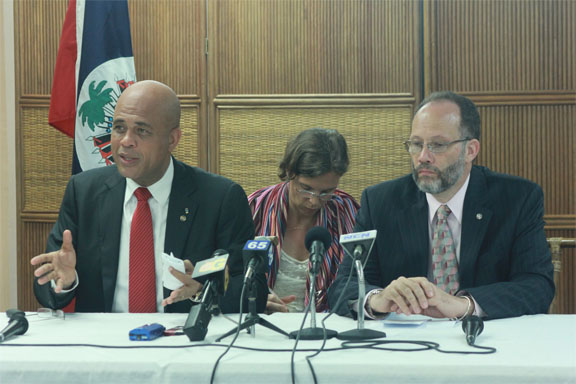Haitian President Michel Martelly feels that the focus and amount of money being spent by the United Nations on security for his country should be shifted instead to job creation, infrastructural development and investment opportunities.
“Security yes but the real insecurity will prevail when you have people who are looking for jobs, people who are looking for food, people who are looking to be free because poverty is your problem…contrary to what is being said Haiti is not insecure…we need to think more about sustainable development than security”, he asserted.
He was at the time speaking at a press conference hosted by the Caricom Secretariat yesterday as part of his inaugural visit in both capacities as Chairman of Caricom and President of Haiti.
Informing that some USD$800M is spent yearly to have foreign troops in the country, Martelly opined that maybe it should go towards development of the country. “The real issue is not reducing, it’s probably converting from a security standpoint to a development standpoint…looking at the amount of money being spent …I am wondering if this could not go to reconstruction and development“, he said.
In addition, the Haitian leader, who took office in 2011, also believes that the economic lift that Haiti needs is not donations and handouts from countries around the world but that those countries tap into the human resource potential and investment opportunities Haiti has to offer. “ It’s not about aid it’s about trade”, he said.

Martelly has appealed to countries globally that they should cultivate long-term investment in Haiti that would support Haitian-owned businesses, ensure rapid job creation which in turn would ensure economic development.
Only recently at the Twenty-Fourth Intersessional Meeting of the Conference of Heads of Government of Caricom, which was held for the first time in Haiti, he reiterated his call to regional leaders for his country to be seen and treated as an opportunity.
Martelly emphasized then that Haiti represents a market of nearly ten million people, potential natural assets and a rich cultural heritage that can make a genuine contribution to the growth of Caricom econo-mies. He said that “Ultimately, a Haitian economy that works best serves the interests of Caricom thus expanding its market and its possibilities of being more competitive.”
Further, that Haiti can be a good provider of agro-food products, including fruits and vegetables, and handicrafts and can also be a good outlet for products from the region.
He had used Jamaica’s USD$10M investment into poultry feed as an example for other Caricom countries to come on board.
Yesterday, Guyana and Haiti signed a food security Memorandum of Understanding (MOU).
Martelly said that he understands that the process will take time but so far is pleased at how relations are progressing with his country and its sister Caricom states. “Everything seems to be simple, yet it is not…things take time” he said.
Overall the Haitian President said that there has been development and pointed to education mobilization and development. He said yesterday that meetings have already been had with the Chancellor of the University of the West Indies and sometime soon Caricom’s Secretary General Irwin Laroque will meet with the Caribbean Examinations Council to discuss the secondary education curricula and possible implementation in Haiti.
Noted too was that although Haiti is not fully a party of Caricom’s free travel within the region programmes are being implemented to gradually get that country there. Martelly said that it has to be a staggered process given Haiti’s large population and poverty. “There will probably have a massive exodus …Haiti is having an economical problem so we have to find a better way for everyone ,to allow everyone to have free movement …such that it don’t create an invasion of the Haitian people who are looking for jobs” he said. However persons who already have visas (to North American and European countries)… can travel free through the Caribbean.




